Sustainability
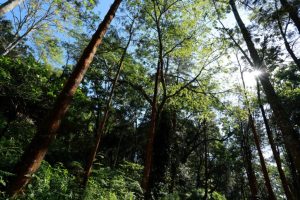
Western Ghat Conservation
With an awareness that all natural ecosystems are vanishing all over the world at an alarming rate, Ibnii has committed a third of its property for the purpose of restoration of forest. This is a section of the property that has been neglected for many years and thus the process of natural regeneration has been happening already. The land has been a plantation for over a hundred years, and so because of neglect the hindrance to regeneration of the forest is the presence of invasive plants that are choking the identified areas. We have more than 50 species of trees already growing here but the whole understory is choked mostly by coffee plants that are growing densely. We have taken up the mammoth task of selectively removing the invasive plants so natural regeneration can happen. This area is already rich in biodiversity, and with a little intervention the succession of forest regrowth can happen better. Additionally this area will be used as a resource to educate our guests about the importance of the natural world.
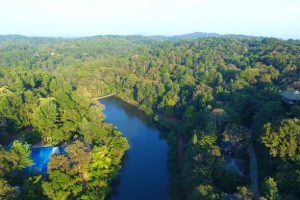
Water Conservation
Unsustainable practices in the name of development have threatened the ecosystem of the Western Ghats to such an extent that only 2% of it remains untouched. This has led to an increase of natural disasters such as landslides, flooding, and much more, resulting in loss of life and property. The concept of Ibnii focuses on sustainable development, and as a result, we have adopted certain measures to arrest the wastage of resources. We have installed one of a kind ‘Low Flow Plumbing Fixtures’ that dispenses mist and saves water. Optimal use of water is of paramount importance, hence the jacuzzis in our property operate only for only 6 months in a year. Our rainwater harvesting system, along with our Water Treatment Plant, Sewage Treatment Plant, and Effluent Treatment Plant, collectively make the water management at Ibnii par excellence. We have 4 rainwater catchments, the water is treated and is used throughout the resort. The water you drink, the water out of the taps, the water used to cook food are the purest form of water, rainwater. Our vast water catchment areas use rainwater not just to run the resort, but also to sustain the coffee plantation.
IBNII Has Two Water Treatment Plants:
- Effluent Treatment Plant (ETP) which takes used water from our laundry service and
usable water for plants.
- Sewage Treatment Plant (STP) which takes all sewage water and treats it, to be used for our plantation.
We also have a bottling plant where all the glass bottles are sanitised, filled and served to guests in their rooms, the restaurant and coffee shop.
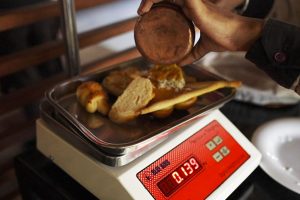
Weigh the Waste
Weigh the Waste' is a pioneering project established to address the issue of food waste management. We, as a conscious and responsible community, have developed a system that effectively reduces food wastage while simultaneously helping to curb hunger. Although we understand that our efforts may seem small, we firmly believe that collective action can lead to significant change. With your support, we can ensure that hungry children are fed, and our planet has a chance to sustainably thrive.
Here's how it works:
Following each meal, the food waste generated by each plate is weighed, and the weight of the waste is charged to the guest. This amount is then donated to help underprivileged children. Currently, IBNII has partnered with an orphanage in Madikeri as part of this initiative.
For instance, the steward notes down the guest's room number, name, the amount of waste in grams, and the corresponding price. The cost starts at Rs 100 for 10 gms of waste and increases to Rs 150 for 15 gms and so on. Guests can have multiple servings, but we humbly request that they do not waste food.
This is only a kind request.
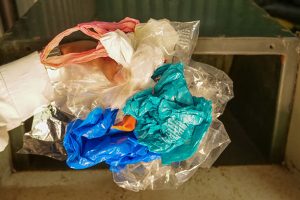
Solid Waste Management
At the dry garbage room, we segregate the varied kinds of solid waste generated at Ibnii. Biodegradable and Non-biodegradable waste is separated and used for a variety of purposes. Dry leaves are shredded and used to aid the daily dump composting process. We encourage our guests not to bring plastic into the resort, all the plastic we collect at the resort is converted into interlock tiles used in the path around the lake. We have taken every measure to ensure that we have minimal to no plastic use in the resort and have alternative options to plastic. All the Non-biodegradable waste collected is segregated into three types; mainly Paper, Plastic, and Metal. The waste is segregated accordingly and is sent to an NGO we have tied up with in Mysore, called ‘Hasirudala’, where they recycle and divert the garbage from ending up at landfills. The sanitary waste collected at Ibnii is disposed of by burning it in our incinerators.
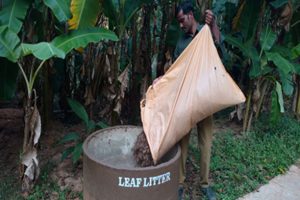
Composting
Making the best out of waste is the IBNII Motto, besides using some of the waste directly as manure on our fields; we employ certain eco-friendly methods to manage our waste. All units of food waste are segregated before being dispatched to different destinations. We employ a simple and innovative waste management and composting system that converts food waste into useful compost. The food waste from the main kitchen and staff cafeteria are taken to the ‘Daily Dump’ where it is mixed with shredded leaves and coco peat. This compost is used in our coffee plantation and bio-gardens as a starter for the saplings. The compost has been tested and certified by the Coffee Board of Chikmagalur. The leaves fallen on the pathways are collected in ‘Leaf Litter Composting Areas’. Earthworms act on it and convert the leaves into Leaf Litter Compost.
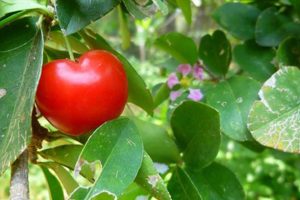
Produce to Plate / Farm to Fork
Our restaurant and fine dining options are in absolute sync with nature. Our culinary excellence stems from the concept of ‘Farm to Fork’. The food is made fresh with no additives, preservatives, synthetic flavours or colours, and as nature meant for it to be, pure and natural. We have nurtured 3 bio-gardens within our property where we try to meet our in-house needs of vegetables and fruits. This ensures that the food we are serving is made from the freshest ingredients which are seasonal, and are harvested when they taste the best. This also reduces your carbon footprint that occurs during the harvesting, washing, shipping and distribution of food. We grow spices such as cardamom, pepper and turmeric. All the coffee served at Ibnii comes from our expansive 40 acre coffee plantation.
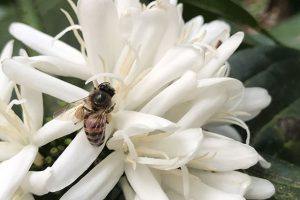
Apiculture / Beekeeping
It is believed that if bees disappeared off the face of the earth, man would only have four years left to live. That’s how important these little creatures are to the ecosystem. Sadly, they are dying from a variety of factors—pesticides, drought, habitat destruction, nutrition deficit, air pollution, global warming and more. At Ibnii, we have assembled 7 bee boxes in which native species of bees thrive. They help pollinate the wild forest flowers and also the coffee blossoms. We extract honey from the hives without destroying the combs during the summer and spring season. The honey extracted is used in our kitchens and sold at our shop, Almari.
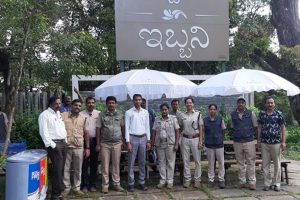
Community Engagement
In 2019, 80 children from 5 schools across Kodagu took part in ‘Ibnii’s Green Run’ to raise awareness about the importance of protecting our forests. This was done to engage with the community in longer format dialogues with regards to sustainability and sustainable environment practices. The run started at Madikeri and ended at Ibnii’s gates. The young marathon participants were given awards for participating in the run and a trophy was awarded to the school that managed to spread the maximum amount of environmental awareness. The children were then invited along with their teachers to partake in activities within the resort and experience food cooked by sustainable means. The Ibnii Sustainability Documentary was screened for the students after which various dignitaries delivered speeches.
On 2nd October 2018 Ibnii held a CSR event wherein our employees got together and decided to clean up the small settlements around us. CSR is a revolutionary way of contributing more towards driving systematic social changes which directly lead to social benefits. We wanted this event to be all about better sanitation, area hygiene, cleanliness, and waste management.
The initiative witnessed active participation from all our employees, wherein they cleaned up the roads, demonstrated how to dump garbage in the designated places, and helped in the cleaning of toilets.
We also held a seminar for the rural folk where we spoke about hygiene and its importance, while conducting an awareness campaign targeting women and children and sowing the seeds of good hygiene for the future.
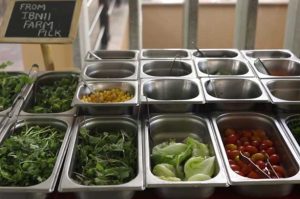
Organic and Ethical Farming Practices
We at Ibnii have incorporated several ethical farming practices that let the plants grow at their own pace as nature intended to. We do not have sprinkler irrigation as the plants grown at Ibnii are endemic to this region and are drought resistant. The only form of pest control we do for our flora is a mixture of neem oil and warm water being sprayed. The trees in the plantation areas are not trimmed as they provide shelter to the different species of birds that call Ibnii home. We make ‘Jeevamrutham’ from the dung and urine of the cows and use it as a natural fertilizer to make the soil more nitrogenous. The jackfruits and wild figs growing in the property remain untouched for the consumption of our wild animals.
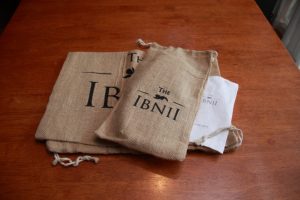
Ecorium / Fabric Upcycling
The IBNII invests in research and development for sustainability, our ecorium, which stands for Emerging Centre of Recycling and Intelligent Use of Materials, sees to it that any solid waste whatsoever is used productively. From lampposts to signboards, a variety of useful items are produced at the Ecorium workshop. Our pillows, covers, towels, floor mats and napkins come from upcycled or recycled sources. Even the soaps and shampoos come from vendors who share the same philosophy as the IBNII, all to ensure sustainability. We have our very own Fabric Recycling and stitching unit at the IBNII, incorporated within our housekeeping system, where every little piece of discarded cloth is upcycled. Jute and cloth bags, cushions, and much more are made. We make sure that even the smallest element doesn’t go to waste.

Western Ghat Conservation
With an awareness that all natural ecosystems are vanishing all over the world at an alarming rate, Ibnii has committed a third of its property for the purpose of restoration of forest. This is a section of the property that has been neglected for many years and thus the process of natural regeneration has been happening already. The land has been a plantation for over a hundred years, and so because of neglect the hindrance to regeneration of the forest is the presence of invasive plants that are choking the identified areas. We have more than 50 species of trees already growing here but the whole understory is choked mostly by coffee plants that are growing densely. We have taken up the mammoth task of selectively removing the invasive plants so natural regeneration can happen. This area is already rich in biodiversity, and with a little intervention the succession of forest regrowth can happen better. Additionally this area will be used as a resource to educate our guests about the importance of the natural world.
Water Conservation
Unsustainable practices in the name of development have threatened the ecosystem of the Western Ghats to such an extent that only 2% of it remains untouched. This has led to an increase of natural disasters such as landslides, flooding, and much more, resulting in loss of life and property. The concept of Ibnii focuses on sustainable development, and as a result, we have adopted certain measures to arrest the wastage of resources. We have installed one of a kind ‘Low Flow Plumbing Fixtures’ that dispenses mist and saves water. Optimal use of water is of paramount importance, hence the jacuzzis in our property operate only for only 6 months in a year. Our rainwater harvesting system, along with our Water Treatment Plant, Sewage Treatment Plant, and Effluent Treatment Plant, collectively make the water management at Ibnii par excellence. We have 4 rainwater catchments, the water is treated and is used throughout the resort. The water you drink, the water out of the taps, the water used to cook food are the purest form of water, rainwater. Our vast water catchment areas use rainwater not just to run the resort, but also to sustain the coffee plantation.
IBNII Has Two Water Treatment Plants:
– Effluent Treatment Plant (ETP) which takes used water from our laundry service and
usable water for plants.
– Sewage Treatment Plant (STP) which takes all sewage water and treats it, to be used for our plantation.
We also have a bottling plant where all the glass bottles are sanitised, filled and served to guests in their rooms, the restaurant and coffee shop.
Weigh the Waste
Weigh the Waste’ is a pioneering project established to address the issue of food waste management. We, as a conscious and responsible community, have developed a system that effectively reduces food wastage while simultaneously helping to curb hunger. Although we understand that our efforts may seem small, we firmly believe that collective action can lead to significant change. With your support, we can ensure that hungry children are fed, and our planet has a chance to sustainably thrive.
Here’s how it works:
following each meal, the food waste generated by each plate is weighed, and the weight of the waste is charged to the guest. This amount is then donated to help underprivileged children. Currently, IBNII has partnered with an orphanage in Madikeri as part of this initiative.
For instance, the steward notes down the guest’s room number, name, the amount of waste in grams, and the corresponding price. The cost starts at Rs 100 for 10 gms of waste and increases to Rs 150 for 15 gms and so on. Guests can have multiple servings, but we humbly request that they do not waste food.
We would like to extend our heartfelt appreciation to our guests for their unwavering support.
Solid Waste Management
At the dry garbage room, we segregate the varied kinds of solid waste generated at Ibnii. Biodegradable and Non-biodegradable waste is separated and used for a variety of purposes. Dry leaves are shredded and used to aid the daily dump composting process. We encourage our guests not to bring plastic into the resort, all the plastic we collect at the resort is converted into interlock tiles used in the path around the lake. We have taken every measure to ensure that we have minimal to no plastic use in the resort and have alternative options to plastic. All the Non-biodegradable waste collected is segregated into three types; mainly Paper, Plastic, and Metal. The waste is segregated accordingly and is sent to an NGO we have tied up with in Mysore, called ‘Hasirudala’, where they recycle and divert the garbage from ending up at landfills. The sanitary waste collected at Ibnii is disposed of by burning it in our incinerators.
Composting
Making the best out of waste is the IBNII Motto, besides using some of the waste directly as manure on our fields; we employ certain eco-friendly methods to manage our waste. All units of food waste are segregated before being dispatched to different destinations. We employ a simple and innovative waste management and composting system that converts food waste into useful compost. The food waste from the main kitchen and staff cafeteria are taken to the ‘Daily Dump’ where it is mixed with shredded leaves and coco peat. This compost is used in our coffee plantation and bio-gardens as a starter for the saplings. The compost has been tested and certified by the Coffee Board of Chikmagalur. The leaves fallen on the pathways are collected in ‘Leaf Litter Composting Areas’. Earthworms act on it and convert the leaves into Leaf Litter Compost.
Produce to Plate / Farm to Fork
Our restaurant and fine dining options are in absolute sync with nature. Our culinary excellence stems from the concept of ‘Farm to Fork’. The food is made fresh with no additives, preservatives, synthetic flavours or colours, and as nature meant for it to be, pure and natural. We have nurtured 3 bio-gardens within our property where we try to meet our in-house needs of vegetables and fruits. This ensures that the food we are serving is made from the freshest ingredients which are seasonal, and are harvested when they taste the best. This also reduces your carbon footprint that occurs during the harvesting, washing, shipping and distribution of food. We grow spices such as cardamom, pepper and turmeric. All the coffee served at Ibnii comes from our expansive 40 acre coffee plantation.
Apiculture / Beekeeping
It is believed that if bees disappeared off the face of the earth, man would only have four years left to live. That’s how important these little creatures are to the ecosystem. Sadly, they are dying from a variety of factors—pesticides, drought, habitat destruction, nutrition deficit, air pollution, global warming and more. At Ibnii, we have assembled 7 bee boxes in which native species of bees thrive. They help pollinate the wild forest flowers and also the coffee blossoms. We extract honey from the hives without destroying the combs during the summer and spring season. The honey extracted is used in our kitchens and sold at our shop, Almari.
Community Engagement
In 2019, 80 children from 5 schools across Kodagu took part in ‘Ibnii’s Green Run’ to raise awareness about the importance of protecting our forests. This was done to engage with the community in longer format dialogues with regards to sustainability and sustainable environment practices. The run started at Madikeri and ended at Ibnii’s gates. The young marathon participants were given awards for participating in the run and a trophy was awarded to the school that managed to spread the maximum amount of environmental awareness. The children were then invited along with their teachers to partake in activities within the resort and experience food cooked by sustainable means. The Ibnii Sustainability Documentary was screened for the students after which various dignitaries delivered speeches. On 2nd October 2018 Ibnii held a CSR event wherein our employees got together and decided to clean up the small settlements around us. CSR is a revolutionary way of contributing more towards driving systematic social changes which directly lead to social benefits. We wanted this event to be all about better sanitation, area hygiene, cleanliness, and waste management.
The initiative witnessed active participation from all our employees, wherein they cleaned up the roads, demonstrated how to dump garbage in the designated places, and helped in the cleaning of toilets.
We also held a seminar for the rural folk where we spoke about hygiene and its importance, while conducting an awareness campaign targeting women and children and sowing the seeds of good hygiene for the future.
Organic and Ethical Farming Practices
We at Ibnii have incorporated several ethical farming practices that let the plants grow at their own pace as nature intended to. We do not have sprinkler irrigation as the plants grown at Ibnii are endemic to this region and are drought resistant. The only form of pest control we do for our flora is a mixture of neem oil and warm water being sprayed. The trees in the plantation areas are not trimmed as they provide shelter to the different species of birds that call Ibnii home. We make ‘Jeevamrutham’ from the dung and urine of the cows and use it as a natural fertilizer to make the soil more nitrogenous. The jackfruits and wild figs growing in the property remain untouched for the consumption of our wild animals.
Ecorium / Fabric Upcycling
The IBNII invests in research and development for sustainability, our ecorium, which stands for Emerging Centre of Recycling and Intelligent Use of Materials, sees to it that any solid waste whatsoever is used productively. From lampposts to signboards, a variety of useful items are produced at the Ecorium workshop. Our pillows, covers, towels, floor mats and napkins come from upcycled or recycled sources. Even the soaps and shampoos come from vendors who share the same philosophy as the IBNII, all to ensure sustainability. We have our very own Fabric Recycling and stitching unit at the IBNII, incorporated within our housekeeping system, where every little piece of discarded cloth is upcycled. Jute and cloth bags, cushions, and much more are made. We make sure that even the smallest element doesn’t go to waste.
Get in touch
- 123 Ibnivalavadi Village, Boikeri, Madikeri, Coorg, Karnataka India.
- [email protected]
- Reservations: +91 80 4718 3111
- Resort board number: +91 82 7222 6700
More about us
Copyright 2023 THE IBNII COORG, RESORT & SPA
